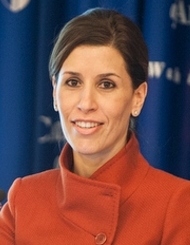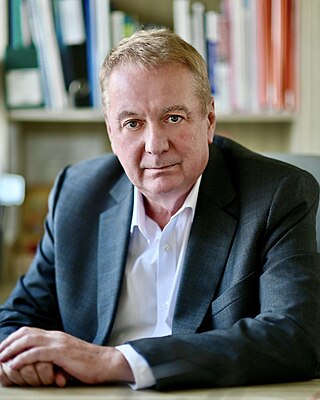Related Research Articles

A pandemic is an epidemic of an infectious disease that has a sudden increase in cases and spreads across a large region, for instance multiple continents or worldwide, affecting a substantial number of individuals. Widespread endemic diseases with a stable number of infected individuals such as recurrences of seasonal influenza are generally excluded as they occur simultaneously in large regions of the globe rather than being spread worldwide.

Severe acute respiratory syndrome (SARS) is a viral respiratory disease of zoonotic origin caused by the virus SARS-CoV-1, the first identified strain of the SARS-related coronavirus. The first known cases occurred in November 2002, and the syndrome caused the 2002–2004 SARS outbreak. In the 2010s, Chinese scientists traced the virus through the intermediary of Asian palm civets to cave-dwelling horseshoe bats in Xiyang Yi Ethnic Township, Yunnan.

Children's National Hospital is a freestanding, 323-bed, pediatric acute care children's hospital located in Washington D.C. It is affiliated with the George Washington University School of Medicine and the Howard University College of Medicine. The hospital provides comprehensive pediatric specialties and subspecialties to infants, children, teens, and young adults aged 0–21 throughout the region. The hospital features an ACS verified level I pediatric trauma center, the only one in the District of Columbia. Its pediatric intensive care unit and neonatal intensive care units serve the region. The hospital also has a rooftop helipad for critical pediatric transport.

Sir Jeremy James Farrar is a British medical researcher who has served as Chief Scientist at the World Health Organization since 2023. He was previously the director of The Wellcome Trust from 2013 to 2023 and a professor of tropical medicine at the University of Oxford.

Luciana Borio is a Brazilian-American infectious disease physician and public health administrator. She is a vice president at In-Q-Tel. She previously served as director for Medical and Biodefense Preparedness at the National Security Council, acting chief scientist of the U.S. Food and Drug Administration (FDA), assistant commissioner for counterterrorism policy of the FDA, and director of FDA's Office of Counterterrorism and Emerging Threats. She is known for her work advancing clinical trials, the development of medical countermeasures for health emergencies, and the public health responses to Ebola and Zika outbreaks.
Dame Anne Mandall Johnson DBE FMedSci is a British epidemiologist, known for her work in public health, especially the areas of HIV, sexually transmitted infections and infectious diseases.

The Coalition for Epidemic Preparedness Innovations (CEPI) is a foundation that takes donations from public, private, philanthropic, and civil society organisations, to finance independent research projects to develop vaccines against emerging infectious diseases (EID).

Dale Andrew Fisher is an infectious diseases physician who specialises in Infectious Diseases and a Senior Consultant in the Division of Infectious Diseases at the National University Hospital, Singapore. He is also a professor of medicine at the Yong Loo Lin School of Medicine, National University of Singapore, and the chair of the National Infection Prevention and Control Committee through the Ministry of Health, Singapore. In 2020, he became group chief of Medicine for National University Health Systems.

Syra Madad is an American pathogen preparedness expert and infectious disease epidemiologist. Madad is the Senior Director of the System-wide Special Pathogens Program at NYC Health + Hospitals where she is part of the executive leadership team which oversees New York City's response to the Coronavirus disease 2019 pandemic in the city's 11 public hospitals. She was featured in the Netflix documentary series Pandemic: How to Prevent an Outbreak and the Discovery Channel documentary The Vaccine: Conquering COVID.
Allison Joan McGeer is a Canadian infectious disease specialist in the Sinai Health System, and a professor in the Department of Laboratory Medicine and Pathobiology at the University of Toronto. She also appointed at the Dalla Lana School of Public Health and a Senior Clinician Scientist at the Lunenfeld-Tanenbaum Research Institute, and is a partner of the National Collaborating Centre for Infectious Diseases. McGeer has led investigations into the severe acute respiratory syndrome outbreak in Toronto and worked alongside Donald Low. During the COVID-19 pandemic, McGeer has studied how SARS-CoV-2 survives in the air and has served on several provincial committees advising aspects of the Government of Ontario's pandemic response.
Colleen S. Kraft is an infectious disease physician, associate professor in the Department of Pathology and Laboratory Medicine, and the director of the Clinical Virology Research Laboratory at Emory University School of Medicine. In 2014, she led Emory University Hospital's effort to treat and care for Ebola virus disease patients and is currently working to address the COVID-19 pandemic in Georgia. She currently serves on Georgia's COVID-19 task force.
Carolyn S. Calfee is a Professor of Medicine and Anaesthesia at the University of California, San Francisco. She works in intensive care at the UCSF Medical Center where she specialises in acute respiratory distress syndrome. During the COVID-19 pandemic Calfee studied why SARS-CoV-2 patients experienced such different symptoms.
Sir Peter William Horby is a British physician, epidemiologist, Moh Family Foundation Professor of Emerging Infections and Global Health, and Director of the Pandemic Sciences Institute at the University of Oxford. He is the founder, and former director of the Oxford University Clinical Research Unit in Hanoi, Vietnam which was founded in 2006. In 2014, Horby established the Epidemic Research Group Oxford (ERGO). ERGO incorporates a number of international projects such as the European Commission funded PREPARE, the African coaLition for Epidemic Research, Response and Training (ALERRT), and the International Severe Acute Respiratory and emerging Infection Consortium (ISARIC). Since 2016, Horby has been chair and executive director of ISARIC.
Science diplomacy is the collaborative efforts by local and global entities to solve global issues using science and technology as a base. In science diplomacy, collaboration takes place to advance science but science can also be used to facilitate diplomatic relations. This allows even conflicting nations to come together through science to find solutions to global issues. Global organizations, researchers, public health officials, countries, government officials, and clinicians have previously worked together to create effective measures of infection control and subsequent treatment. They continue to do so through sharing of resources, research data, ideas, and by putting into effect laws and regulations that can further advance scientific research. Without the collaborative efforts of such entities, the world would not have the vaccines and treatments we now possess for diseases that were once considered deadly such as tuberculosis, tetanus, polio, influenza, etc. Historically, science diplomacy has proved successful in diseases such as SARS, Ebola, Zika and continues to be relevant during the COVID-19 pandemic today.

Maria Petronella Gerarda Koopmans is a Dutch virologist who is Head of the Erasmus MC Department of Viroscience. Her research considers emerging infectious diseases, noroviruses and veterinary medicine. In 2018 she was awarded the Netherlands Organisation for Scientific Research (NWO) Stevin Prize. She serves on the scientific advisory group of the World Health Organization.
Sylvie Champaloux Briand is a French physician who is Director of the Pandemic and Epidemic Diseases Department at the World Health Organization. Briand led the Global Influenza Programme during the 2009 swine flu pandemic. During the COVID-19 pandemic, Briand launched the WHO Information Network for Epidemics which looked to counter the spread of COVID-19 misinformation.
The treatment and management of COVID-19 combines both supportive care, which includes treatment to relieve symptoms, fluid therapy, oxygen support as needed, and a growing list of approved medications. Highly effective vaccines have reduced mortality related to SARS-CoV-2; however, for those awaiting vaccination, as well as for the estimated millions of immunocompromised persons who are unlikely to respond robustly to vaccination, treatment remains important. Some people may experience persistent symptoms or disability after recovery from the infection, known as long COVID, but there is still limited information on the best management and rehabilitation for this condition.

The COVID-19 Genomics UK (COG-UK) consortium was a group of academic institutions and public health agencies in the United Kingdom created in April 2020 to collect, sequence and analyse genomes of SARS-CoV-2 at scale, as part of COVID-19 pandemic response.
Lyda Elena Osorio Amaya is a Colombian physician, epidemiologist and infectious disease specialist. She is an associate professor at the Universidad del Valle, and a researcher at the Centro Internacional de Entrenamiento e Investigaciones Médicas (CIDEIM) in Cali, Valle del Cauca. Osorio's research has focused mainly on vector-borne diseases like malaria, leishmaniasis, Zika and dengue fever. She has also played a role in Colombia's response against COVID-19.
Amesh Adalja is an American infectious disease physician. He specializes in infectious disease, bioterrorism, and emergency medicine at Johns Hopkins Center for Health Security and a clinical assistant professor at the University of Pittsburgh School of Medicine.
References
- ↑ "ERGO & ISARIC". Nuffield Department of Medicine . Archived from the original on 2022-10-04. Retrieved 2022-10-04.
- 1 2 "Membership". ISARIC. Archived from the original on 2022-10-04. Retrieved 2022-10-04.
- 1 2 "ISARIC COVID-19 clinical database passes the half million patient records mark". ISARIC. 2021-07-16. Archived from the original on 2022-10-04. Retrieved 2022-10-04.
- 1 2 Docherty, Annemarie; Semple, Callum. "Collecting COVID-19 data and samples in a way that enables global research (ISARIC-CCP project)". Health Data Research UK. Archived from the original on 2022-01-20. Retrieved 2022-10-05.
- ↑ Dunning, Jake W.; Merson, Laura; Rohde, Gernot G. U.; Gao, Zhancheng; Semple, Malcolm G.; Tran, Dat; Gordon, Anthony; Olliaro, Piero L.; Khoo, Saye H.; Bruzzone, Roberto; Horby, Peter; Cobb, J. Perren; Longuere, Kajsa-Stina; Kellam, Paul; Nichol, Alistair (2014-01-01). "Open source clinical science for emerging infections". The Lancet Infectious Diseases. 14 (1): 8–9. doi:10.1016/S1473-3099(13)70327-X. ISSN 1473-3099. PMC 7158987 . PMID 24355025.
- ↑ "Fellowships". ISARIC. Archived from the original on 2022-10-04. Retrieved 2022-10-04.
- ↑ "£4.5 million award for clinical research consortium to tackle the global threat of epidemic infectious diseases". University of Oxford . 2019-02-08. Archived from the original on 2019-02-11. Retrieved 2025-01-02.
- ↑ ISARIC Clinical Characterisation Group; Baillie, J. Kenneth; Baruch, Joaquin; Beane, Abigail; Blumberg, Lucille; Bozza, Fernando Augusto; Broadley, Tessa; Burrell, Aidan; Carson, Gail; Citarella, Barbara Wanjiru; Dunning, Jake; Elotmani, Loubna; Barrio, Noelia Garcia; Goffard, Jean-Christophe; Goncalves, Bronner (2022-04-13). "ISARIC COVID-19 Clinical Data Report issued: 27 March 2022". medRxiv 10.1101/2020.07.17.20155218v1 .
- ↑ "ISARIC COVID-19 clinical database passes ½ million patient records mark". University of Oxford . 2021-07-16. Archived from the original on 2022-01-28. Retrieved 2022-10-04.
- ↑ Docherty, Annemarie B.; Harrison, Ewen M.; Green, Christopher A.; Hardwick, Hayley E.; Pius, Riinu; Norman, Lisa; Holden, Karl A.; Read, Jonathan M.; Dondelinger, Frank; Carson, Gail; Merson, Laura; Lee, James; Plotkin, Daniel; Sigfrid, Louise; Halpin, Sophie (2020-05-22). "Features of 20 133 UK patients in hospital with covid-19 using the ISARIC WHO Clinical Characterisation Protocol: prospective observational cohort study". BMJ. 369: m1985. doi:10.1136/bmj.m1985. ISSN 1756-1833. PMC 7243036 . PMID 32444460.
- ↑ "Home". ISARIC4C (Comprehensive Clinical Characterisation Collaboration). Archived from the original on 2022-09-01. Retrieved 2022-10-04.
- ↑ Puhan, Milo A.; Sadatsafavi, Mohsen (2022-06-01). "Validation of the 4C prediction models to inform care for patients with COVID-19: final steps towards clinical application". Thorax. 77 (6): 536. doi: 10.1136/thoraxjnl-2021-218313 . ISSN 0040-6376. PMID 35110368. S2CID 246486784.